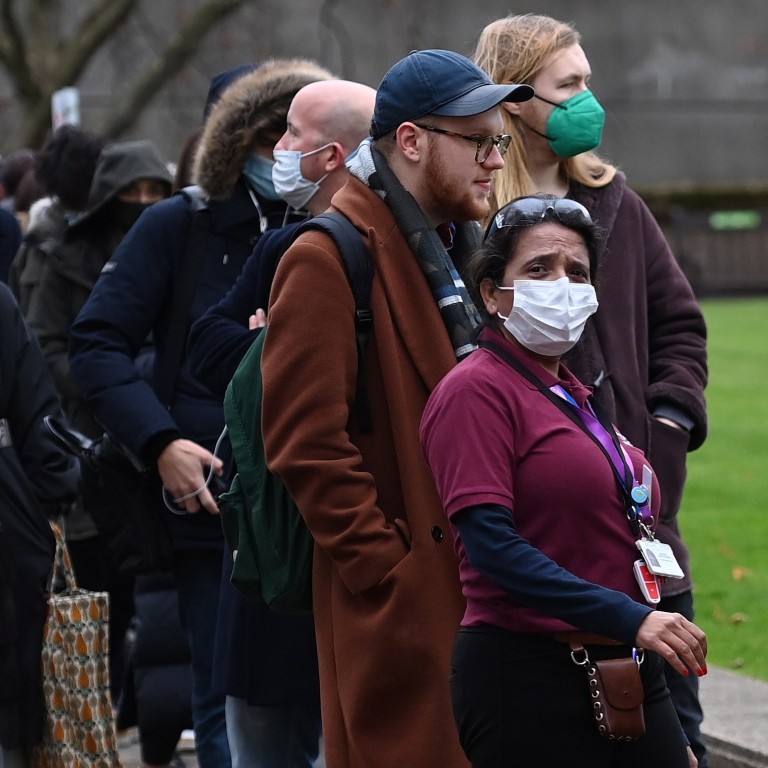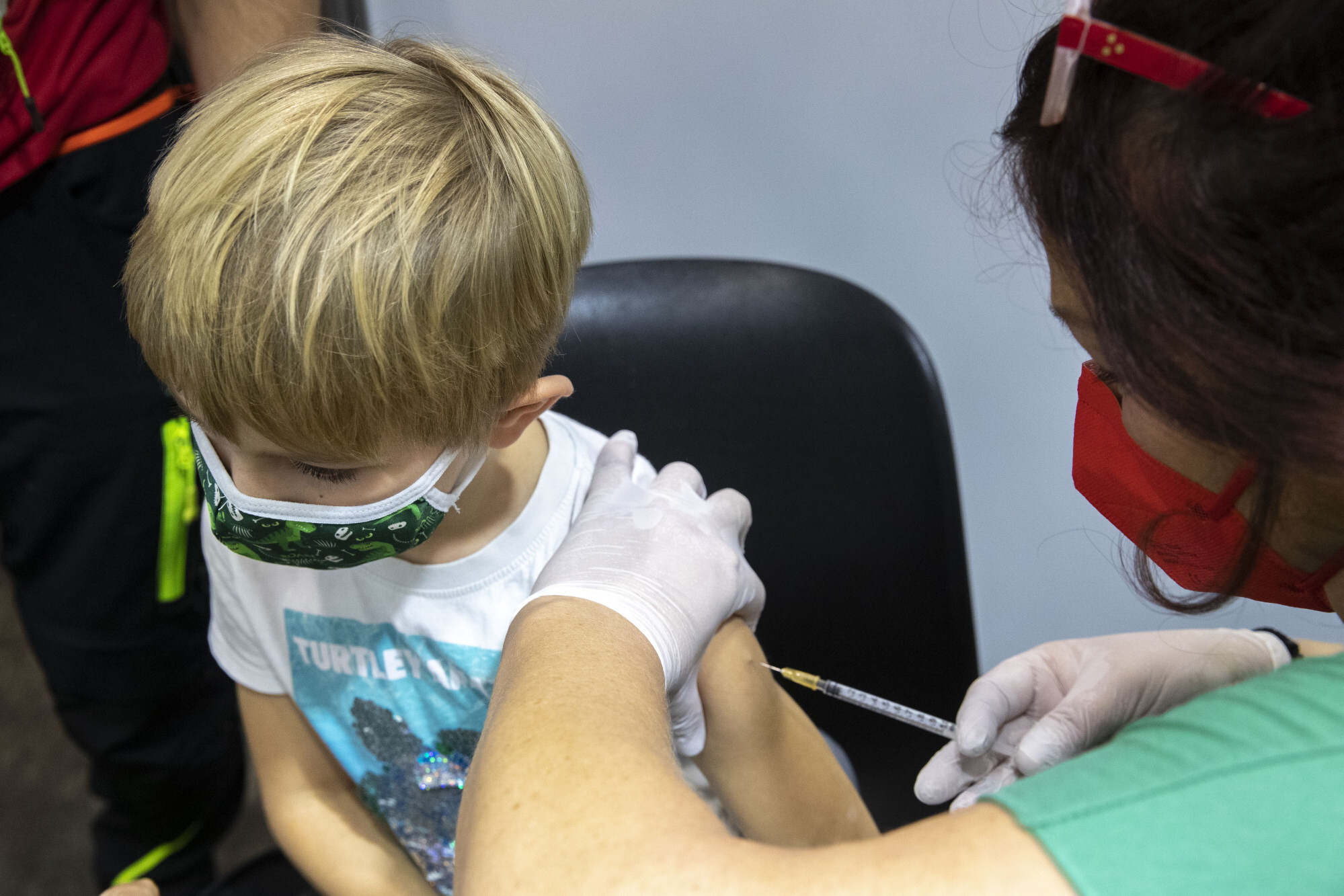
Coronavirus: Britain’s vaccine booster programme hits snag as Omicron spreads
- Those aged under 40 remain unable to book a third shot of vaccine using the government’s website
- Elsewhere, Austria will end a lockdown for vaccinated people, while EU health bodies have recommended mixing and matching vaccines for the initial and booster doses
Britain’s operation to roll out Covid-19 booster shots to all adults is struggling to pick up speed even as the Omicron variant spreads rapidly across the country.
Fewer UK adults received a third shot of vaccine on Saturday than they did seven days earlier, the day when Prime Minister Boris Johnson called for an increase in the pace of the roll-out.
Regulators authorised booster shots for 18- to 39-year-olds two days later, on November 29. However, those aged under 40 remain unable to book a third shot of vaccine using the government’s website.
The latest snags in vaccine delivery come after Britain beat many other countries with its inoculation drive. Despite the challenges facing the booster roll-out campaign, the UK has already delivered 30 booster doses per 100 people, more than double than in the United States and the European Union, according to Our World in Data.
Health Secretary Sajid Javid told Parliament on Monday it was highly likely Britain was seeing community transmission of the new variant, and that Omicron could spread faster than previous variants. A total of 336 cases were already confirmed across the nation, Javid said.
Neil Ferguson, an epidemiologist at Imperial College London who advises the UK government, told the Times newspaper that Omicron infections may be doubling every three days, or even faster.
Latest statistics from Britain showed that 464,616 boosters were administered on December 4, down from 465,111 the Saturday before.
Why hopes the Omicron variant will be less deadly may be premature
While the weekly figure rose slightly to 2.68 million from 2.56 million, there is still some way to go to meet the government’s target of 3.5 million jabs per week. Britain reported 51,459 cases of Covid-19 on Monday, up from 30,305 a month earlier.
Johnson said the UK government would wait for guidance on the omicron strain ahead of a review of pandemic rules next week. Until then, the prime minister has given Britons the green light to go ahead with festive events such as staff Christmas parties.

Elsewhere in the region, Austria will end a nationwide lockdown this weekend for people who have been inoculated against Covid-19 or have recovered from the virus, while continuing to limit participation in public life for those who refuse to be vaccinated.
The government will meet regional leaders on Wednesday to assess the measures needed to keep the pandemic contained and turn a “tendency of falling cases into a trend”, Chancellor Karl Nehammer told reporters in Vienna.
The measures have helped halve the number of seven-day infections per 100,000 inhabitants from as high as 1,110 at the start of the lockdown, even as occupancy of intensive-care units remains near a record.
Norway party is biggest Omicron superspreader outside South Africa
The reopening of places like retail shops and hairdressers is in line with plans announced before the lockdown began on November 22. The policy was imposed to not only stem infections but also raise Austrian vaccination rates, which remain stuck in the lower half of countries tracked by the European Centre for Disease Prevention and Control.
Austria’s Chancellor, who was sworn in on Monday, said some restrictions may remain for hotels and restaurants, and regional leaders have the option to impose stricter local measures.
“If you are ready to accept scientific results, get a vaccination and protect others, then you will regain your freedom,” Nehammer said.
Austria is one of few European nations to return to strict restrictions in the latest wave of the pandemic. It also plans to impose mandatory vaccinations from February and fine dissenters.

In Germany, the outgoing health minister on Tuesday said travel curbs that limited arrivals to the European Union were important until more was known about the Omicron variant.
Late in November, EU states agreed to impose travel restrictions on seven southern African countries after they reported several cases of the Omicron variant, which is considered highly infectious.
“Until we know more, we need to be careful and so travel restrictions are important to keep the entry in Europe and Germany as low as possible,” Jens Spahn told reporters as he arrived for a meeting of EU health ministers in Brussels.
Ahead of Tuesday’s meeting, EU Health Commissioner Stella Kyriakides said: “We are facing a very challenging epidemiological situation in all members states with the COVID-19 pandemic, made especially challenging with the appearance of the Omicron variant.”
She said she would urge ministers to step up vaccinations and, when necessary, to promote other non-pharmaceutical measures, such as requiring the wearing of masks and social distancing.
Evidence suggests that the combination of viral vector vaccines and mRNA vaccines produces good levels of antibodies against the coronavirus causing Covid-19, the European Medicines Agency (EMA) and the European Centre for Disease Prevention and Control (ECDC) said in a statement.
Their endorsement comes after a major study on Monday said a first dose of AstraZeneca or Pfizer-BioNTech shots followed by a Moderna vaccine nine weeks later induced a better immune response.
The US has given the green light to mix-and-match, while the World Health Organization is also assessing the approach.
Black and Asian Britons ‘have higher coronavirus death rates’
Longevity of protection offered by vaccines has been under scrutiny and the world is scrambling to trace the Omicron variant as governments are imposing fresh restrictions. Official roll-out of vaccines for 5 to 11-year-olds will start next week in Europe.
“The use of heterologous schedules may offer flexibility in terms of vaccination options, particularly to reduce the impact on the vaccine roll-out should a vaccine not be available for any reason,” the EMA and ECDC said.
The recommendations are also meant to help EU member states with their own vaccination campaigns before any formal EU-wide approval as the health agencies continue studying data on mixing vaccines.
Reporting by Bloomberg, Reuters

